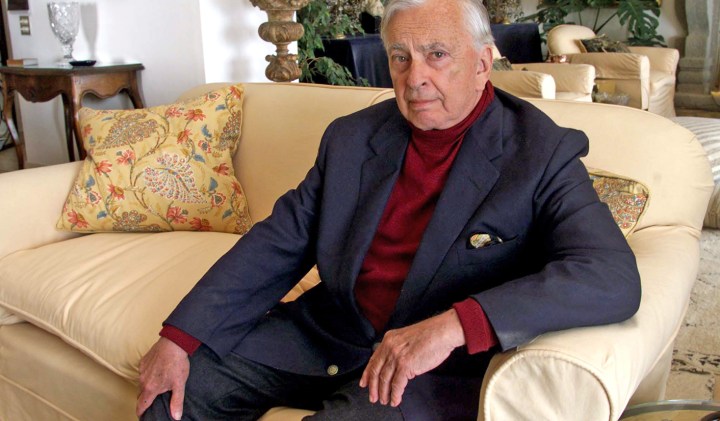Maverick Life
Gore Vidal, America’s perpetual enfant terrible, dies at 86

Gore Vidal, the American writer who became wealthy, famous, prolific, and endlessly controversial in the process, died on 31 July at the age of 86 in Los Angeles. He built a literary reputation as a bold, imaginative stylist who delighted in verbal fisticuffs with other equally feisty writers. Versatile as a writer, he demonstrated this agility as a novelist, essayist, playwright and cinema scriptwriter who leaves a body of work that ranges across contemporary and historical American life and politics, as well as the changing sexual mores of his times. J. BROOKS SPECTOR takes a long look back.
To many, Gore Vidal behaved as (and was) a man “to the manor born” as well as a “traitor to his class”. He had family connections to Jacqueline Kennedy Onassis (they shared a step-father) and to Al Gore – and historically back to yet other American political figures. Simultaneously, he was a shameless namedropper in print and in person, ranging from those same political figures with whom he had connections and then on through figures like Tennessee Williams, Mick Jagger, Orson Welles, Frank Sinatra, Marlon Brando, Paul Newman and Joanne Woodward, Tim Robbins and Susan Sarandon. He attempted a political career with the support of redoubtable figures like Eleanor Roosevelt and Harry Truman; he worked – uncredited – on the script of Ben-Hur as well as other films; and he eventually made television guest appearances on everything from the cartoon series The Simpsons to the late 1960s counter-culture television hit Rowan and Martin’s Laugh-In.
His public spats were legendary and frequently played out on national television, as with tussles with conservative polemicist and editor William F. Buckley Jr. or the equally combative novelist Norman Mailer. In a 1971 essay he had compared Norman Mailer to Charles Manson, and a few months later Mailer head-butted him in the green room while the two were waiting to appear on The Dick Cavett Show. They then took their quarrel right onto the air in an exchange that ended with Cavett telling Mailer to take a piece of paper on the table in front of them and “fold it five ways and put it where the moon don’t shine”.
Back in 1968, while covering the Democratic National Convention for television, Vidal called Buckley a “cryptofascist”. Buckley responded by calling Vidal a “queer”, and the two were in court over the matter for years. And in 1975, Vidal sued Truman Capote for libel after Capote had written that Vidal had been thrown out of the Kennedy White House. Vidal eventually won a grudging apology in the matter.
After calling then-influential conservative editor/essayist Norman Podhoretz a member of “the Israeli fifth column” Vidal was labeled an anti-Semite by some. Just to show he was no respecter of status, he called Ronald Reagan the “Acting President” and said his wife, Nancy, was a social climber “born with a silver ladder in her hand”. The man had a real way with that perfect, cutting insult.
Late in life, Vidal also threw verbal punches at George W. Bush, claiming the then-president had surely known in advance about the 9/11 attacks, and he embraced an unlikely defense of and friendship with Timothy McVeigh, the Oklahoma City federal office-building bomber.
Vidal’s sex life also became a part of his public persona and reputation, when he claimed, for example, perhaps in emulation or imitation of the legendary Don Juan, that he had had at least a thousand sexual encounters by age 25. He elaborated that this tally included both homosexual as well as straight trysts. While still a young man he became the model for characters in other people’s novels, as with John Fowles’ A Separate Peace. And although he sometimes claimed to represent the end of American life and letters, in the footsteps of 19th century man of letters Henry Adams, Vidal then chose to live abroad – in his case in Italy – for a quarter century.
But the man could write and write and write and, together with contemporaries Mailer and Capote, he was among the last generation of serious writers who were also genuine public celebrities, figures who were regulars on popular television talk shows and whose antics were written about in newspaper gossip columns. Vidal was the kind of bigger-than-life personality that even people who had never read one of his books or knowingly watched a film he had helped create knew his name.
The works that poured out of his fecund pen included hundreds of essays, best-selling, if controversial novels like Burr, 1876, Lincoln and Myra Breckenridge and the Tony-nominated play The Best Man. The play, a melodrama about a presidential convention, has been revived several times on Broadway, including a current run timed to coincide with this year’s election and was turned into a critically acclaimed film.
Vidal often appeared cold and cynical (he often told people that beneath his chilly exterior there was a vast pool of icy cold water) as he predicted the inevitable decline and fall of democracy, of the 20th century American empire or the destruction of the environment. Simultaneously though, he carried a melancholy nostalgia for lost worlds, for reason and for the centrality of the written word, as well as for “the ancient American sense that whatever is wrong with human society can be put right by human action.”
Vidal often had an awkward relationship with the nation’s literary and political establishment – and the feeling was mutual. He received precious few major literary prizes beyond a National Book Award in 1993 for United States Essays, 1952 -1992, a collection of thoughtful but often infuriating critiques on politics, sexuality, religion and literature, written originally for publications like The Nation, Esquire and the New York Review of Books. Vidal initially declined membership in the American Academy of Arts and Letters, joking that he already belonged to the Diners Club, although he eventually became a member in 1999.
Regardless of his jousting with the literary establishment, somewhat in the footsteps of such writers as Mark Twain and HL Mencken, he was admired as a literary man with a savagely independent streak on everything: literature, culture, politics and, as he liked to call it, “the birds and the bees”. He assailed politicians both living and dead, mocked religion and sexual prudery, steadfastly opposed wars from Vietnam to Iraq and ruthlessly insulted other writers with a kind of savage joy, as when he said the three saddest words in the English language were “Joyce Carol Oates” and that happiest four were “I told you so”. Other writers took their best shots at him in return. Saul Bellow once said of him that “a dune of salt has grown up to season the preposterous things Gore says”, while Ralph Ellison called Vidal a “campy patrician”. But Vidal would always retort that he lived as he pleased. You could just about hear him sneer, “Ha!”
Discussing the number and nature of his sexual encounters, he insisted that they were nothing special in comparison to figures like President John F. Kennedy or playwright Tennessee Williams. Vidal was well known for enjoying a drink or two or three, and he added that he had tried every major drug – once. Vidal never married, and for years shared his villa in Ravello, Italy with his companion, Howard Austen.
Ironically for this longtime critic of American militarism, Vidal was actually born at United States Military Academy, his father’s alma mater. Vidal’s grandfather had been a US senator from Oklahoma, and his father had served in President Franklin Roosevelt’s administration and was an early expert on and exponent of aviation. As a child, Vidal spent considerable time with his grandfather the senator, reading to the senior man from the Constitution.
Formal classrooms bored Vidal and so, following graduation from Phillips Exeter Academy, he enlisted in the Army during World War II and never went to university. He wrote his first book, the war novel Williwaw, while he was still in the military. New York Times literary critic Orville Prescott praised the author as a “canny observer”, but Vidal’s third novel, The City and the Pillar, with its theme of homosexual love, fared poorly at the hands of critics. The book was dedicated to “JT,” Jimmie Trimble, a school classmate killed during the war whom Vidal called the great love of his life.
With his fiction career now entering free fall, however, Vidal turned to writing mystery novels, using various pseudonyms. Then came better success with live stage plays, films and television scriptwriting, including the play The Best Man. In Hollywood he wrote the script for Suddenly Last Summer, added the subtle homoerotic context to Ben-Hur and even acted in several films. One of his works, Visit to a Small Planet, a Cold War parable featuring a space alien who provokes war between the US and the Soviet Union, became a successful Broadway play and a film starring Jerry Lewis.
But more than just a journeyman writer, Vidal saw himself as a wide-ranging man of letters. Besides comic turns and historical novels on America or his more controversial Julian, about a Roman emperor trying to return a Christian empire to its pagan roots, he authored important essays, including a contribution to The New York Review of Books in 1974 on Italo Calvino that brought Calvino to the attention of American readers. His 1987 essay on Dawn Powell restored that author’s reputation and helped bring her works back into print. Readers looked forward to his annual political essays in The Nation as well.
In 1960 he took up politics as a kind of hobby, becoming the Democratic candidate for Congress in an upstate New York district, although he went down to defeat despite Eleanor Roosevelt and Harry Truman’s public campaigning for him. Losing this election, he noted wryly that he had actually garnered more votes than the top of the ticket – John Kennedy. Following Kennedy’s election, he became an intimate at the Kennedy White House for a time, saying with a kind of tragic foreboding that the job of being president was “literally killing” and he publicly worried that “Kennedy may very well not survive”. By 1967, however, his politics had turned sharply leftward and he penned a harshly critical essay of the Kennedys, The Holy Family.
His fiction was taking off by this time as well, however. His 1968 novel, Myra Breckenridge, about a transsexual movie star, did exceptionally well and he was also working on his historical cycle, a series that finally ended with the publication of Lincoln, nearly 20 years later. This book was not a universally acclaimed work, as some critics took issue with Vidal’s portrayal of the 16th president. (For this writer at least, no other work on Lincoln has done as much to make the man a flesh-and-blood character, as opposed to a kind of secular saint.) More recently, Vidal wrote polemic nonfiction best sellers like Perpetual War for Perpetual Peace and Dreaming War: Blood for Oil and the Cheney-Bush Junta.
“Gore was an iconoclast. That was his strength,” former Nation Editor Victor Navasky had said in describing Vidal’s literary strength.
In describing his own gifts, Vidal had said, “I am at heart a propagandist, a tremendous hater, a tiresome nag, complacently positive that there is no human problem which could not be solved if people would simply do as I advise.” Some years ago, Vidal wrote a kind of credo for his beliefs – and how he had lived his life – when he said, “Because there is no cosmic point to the life that each of us perceives on this distant bit of dust at galaxy’s edge, all the more reason for us to maintain in proper balance what we have here. Because there is nothing else. No thing. This is it. And quite enough, all in all.” DM
For more, besides Gore Vidal’s own enormous output, read:
- Gore Vidal, celebrated author, playwright, dies at the AP
- Gore Vidal Dead: American Intellectual, Author and Playwright Dies At 86 at the Huffington Post
- Gore Vidal, elegant writer dies in the New York Times
- Gore Vidal Dies, imperious gadfly and prolific graceful writer was 86 in the Washington Post
Photo: U.S. author Gore Vidal poses at his home in Ravello, southern Italy May 9, 2001. He defended his decision to witness the execution of [Timothy McVeigh] and said he shared the Oklahoma City bomber’s view that government had run amok in America. REUTERS

















 Become an Insider
Become an Insider